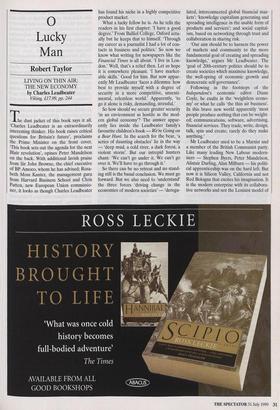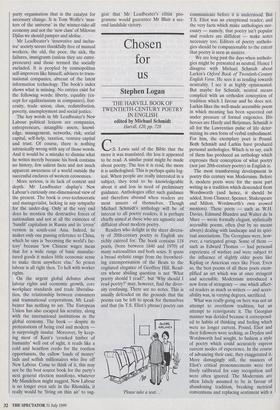0 Lucky Man
Robert Taylor
LIVING ON THIN AIR: THE NEW ECONOMY by Charles Leadbeater Viking £17.99, pp. 244 The dust jacket of this book says it all. `Charles Leadbeater is an extraordinarily interesting thinker. His book raises critical questions for Britain's future', proclaims the Prime Minister on the front cover. `This book sets out the agenda for the next Blair revolution', opines Peter Mandelson on the back. With additional lavish praise from Sir John Browne, the chief executive of BP Amoco, whom he has advised; Rosa- beth Moss Kanter, the management guru from Harvard Business School and Chris Patten, new European Union commissio- ner, it looks as though Charles Leadbeater has found his niche in a highly competitive product market.
What a lucky fellow he is. As he tells the readers in his first chapter: 'I have a good degree.' From Balliol College, Oxford actu- ally but he keeps that to himself. 'Through my career as a journalist I had a lot of con- tacts in business and politics.' So now we know what writing for newspapers like the Financial Times is all about. 'I live in Lon- don.' Well, that's a relief then. Let us hope it is somewhere pleasant. 'I have market- able skills.' Good for him. But now appar- ently Mr Leadbeater 'faces a dilemma: how best to provide myself with a degree of security in a more competitive, unsenti- mental, relentless world.' Apparently, 'to go it alone is risky, demanding, stressful.'
So how should we secure greater security `in an environment as hostile as the mod- em global economy'? The answer appar- ently lies inside the Leadbeater family's favourite children's book — We're Going on a Bear Hunt. In the search for the bear, 'a series of daunting obstacles' lie in the way — 'deep mud, a cold river, a dark forest, a violent storm'. But our intrepid hunters chant: 'We can't go under it. We can't go over it. We'll have to go through it.'
So there can be no retreat and no stand- ing still is the banal conclusion. We must go forward. But we also need to 'understand' the three forces 'driving change in the economies of modem societies' — `deregu- lated, interconnected global financial mar- kets'; 'knowledge capitalism generating and spreading intelligence in the usable form of products and services'; and social capital- ism, based on networking through trust and collaboration in sharing risk.
`Our aim should be to harness the power of markets and community to the more fundamental goal of creating and spreading knowledge,' argues Mr Leadbeater. The `goal of 20th-century politics should be to create societies which maximise knowledge, the well-spring of economic growth and democratic self-governance'.
Following in the footsteps of the Independent's economic editor Diane Coyle, he exults in the 'weightless econo- my' or what he calls 'the thin air business'. In this brave new world apparently 'most people produce nothing that can be weight- ed; communications, software, advertising, financial services. They trade, write, design, talk, spin and create; rarely do they make anything.'
Mr Leadbeater used to be a Marxist and a member of the British Communist party. Like many leading New Labour modern- isers — Stephen Byers, Peter Mandelson, Alistair Darling, Alan Milburn — his politi- cal apprenticeship was on the hard left. But now it is Silicon Valley, California and not Red Bologna that excites his imagination. It is the modem enterprise with its collabora- tive networks and not the Leninist model of party organisation that is the catalyst for necessary change. It is Tom Wolfe's 'mas- ters of the universe' in the winner-take-all economy and not the 'new class' of Milovan Djilas we should pamper and idolise.
Mr Leadbeater's 'innovative and inclus- ive' society seems thankfully free of manual workers, the old, the poor, the sick, the failures, immigrants (unless they are entre- preneurs) and those termed the socially excluded. It is peopled by cosmopolitan self-improvers like himself, advisers to trans- national companies, abreast of the latest information technology. The book's index shows what is missing. No entries exist for the following words: liberty, equality (ex- cept for egalitarianism in companies), frat- ernity, trade union, class, redistribution, poverty, unemployment and social justice.
The key words in Mr Leadbeater's New Labour political lexicon are companies, entrepreneurs, intangible assets, knowl- edge, management, networks, risk, social capital, self-help, taxation, venture capital and trust. Of course, there is nothing intrinsically wrong with any of those words. And it would be a mistake to dismiss what he writes merely because his book contains no history, few salient facts and not much apparent awareness of a world outside the successful enclaves of western economies.
More serious, is its lack of context and depth. Mr Leadbeater display's New Labour's curiously one-dimensional view of the present. The book is over-technocratic and managerialist, lacking in any sympathy for the under-dog. Only at the very end does he mention the destructive forces of nationalism and not at all the existence of `bandit' capitalism in Russia and its 'crony' version in south-east Asia. Indeed, he makes only one passing reference to China, which he says is 'becoming the world's fac- tory' because low Chinese wages mean that for a wide range of basic manufac- tured goods it makes little economic sense to make them anywhere else.' So prison labour is all right then. To hell with worker rights.
On the urgent global debates about labour rights and economic growth, core workplace standards and trade liberalisa- tion, the relationship between consumers and transnational corporations, Mr Lead- beater has nothing to say. The European Union has also escaped his scrutiny, along with the international institutions in the global economy. The book — despite its protestations of being cool and modern is surprisingly insular. Moreover, by keep- ing most of Kant's 'crooked timber of humanity' well out of sight, it reads like a cold and heartless credo for the rootless opportunists, the callow 'loads of money' lads and selfish millionaires who live off New Labour. Come to think of it, this may not be the best source book for the party's next general election manifesto, whatever Mr Mandelson might suggest. Now Labour is no longer even safe in the Rhondda, it really would be 'living on thin air' to sug- gest that Mr Leadbeater's elitist pro- gramme would guarantee Mr Blair a sec- ond landslide victory.



























































 Previous page
Previous page